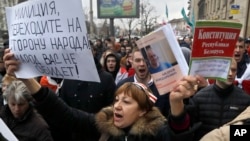Several thousand Belarusians rallied Wednesday to protest an unpopular labor law in a challenge to the ex-Soviet republic's longtime ruler.
The march in the capital Minsk and smaller rallies in several other Belarusian cities were the latest in a series of demonstrations against the law, which required citizens to pay the equivalent of $250 if they work less than half the year and do not register with state labor exchanges.
Earlier this month, Belarus' President Alexander Lukashenko suspended collection of the fee - an unprecedented step back for the authoritarian leader who has ruled the 10-million nation with an iron fist since 1994. But Lukashenko's move has failed to end the protests, which have included calls for his resignation.
The demonstrations were the strongest outpouring of discontent in years in the tightly-controlled nation between Russia and Poland, reflecting the pain inflicted by the law amid a two-year recession.
“I have lost patience,” said Andrei Sushkevich, a 43-year-old small trader who attended the rally in Minsk together with his unemployed wife and their 7-year old son. “We need to fight this rotten Soviet-style system or leave the country.”
Sushkevich was holding a picture of Lukashenko with an inscription “Enough!” Participants in the march, which was sanctioned by the authorities, were calling on Lukashenko to step down, chanting “Go Away!”
“These are protests against poverty, against bad decisions by the government,” said Denis Sadovskiy, one of the organizers of the rally. “Lukashenko no longer has money to pay for the society's loyalty.”
Lukashenko, a former state farm director, has maintained Soviet-style state controls over most of the economy while relentlessly cracking down on opposition and independent media. He has relied on cheap energy and other subsidies and loans provided by Belarus' main sponsor and ally, Russia.
However, Lukashenko's ties with Russia have soured recently amid a spate of economic disputes. When Belarus refused to pay the price Russia charged for its natural gas last year, accumulating a $550 million debt, Moscow responded by sharply cutting supplies of oil. Since the 1991 collapse of the Soviet Union, Belarus had used cheap Russian crude for products that accounted for more than a third of its export revenues.
Amid the spat with Russia, Lukashenko has flirted with the West in a bid to wring concessions from the Kremlin - a strategy he had successfully used in the past. But recent arrests of dozens of opposition activists in response to protests against the labor law could make it harder for the Belarusian leader to mend ties with the West.
“The authorities hadn't expected such a massive wave of protests, and again had to launch the machine of repressions that could significantly slow down the process of normalization of ties with the West,” said Valery Karbalevich, an independent Minsk-based political analyst.




